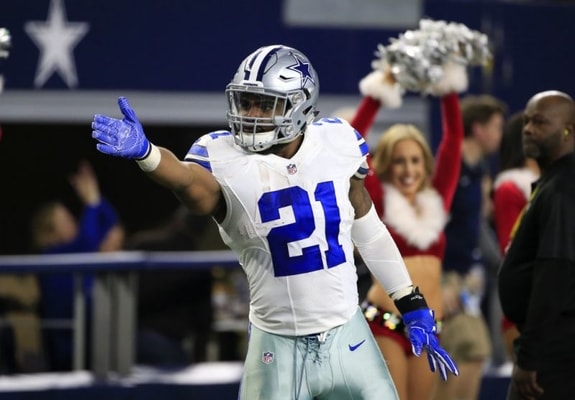
Federal judge Amos Mazzant has granted a request by the NFL Players Association for a temporary restraining order and preliminary injunction to prevent the implementation of a six game suspension for Dallas Cowboys running back Ezekiel Elliott. Elliott was already eligible to play in Sunday’s season opener against the New York Giants, but his suspension for violating the league’s personal conduct policy was to begin Monday. With the injunction granted, Elliott likely will be able to continue playing as the legal process plays out. If the request had been denied, Elliott would have been able to appeal to the U.S. Fifth Circuit Court of Appeals to ask for an immediate stay.
What happened exactly? On August 11, NFL commissioner Roger Goodell announced Elliott’s six game suspension after the league found that he had inflicted physical harm on former girlfriend Tiffany Thompson in July of 2016. Elliott has denied the claims. Authorities in Columbus (where the alleged incident took place) did not pursue charges against Elliott, but the league policy on personal conduct has a lower burden of proof threshold than a criminal conviction. Goodell worked with a four-person advisory committee to determine whether Elliott deserved to be punished. However, it was revealed that there were some issues with Thompson’s credibility and would not have recommended discipline for Elliott based on what was found.
This is all extremely interesting, don’t you think? On one hand, they are saying that the suspension couldn’t be given because the witness (or ex girlfriend in this case) wasn’t credible enough to provide the proper statement. And yet, he was still disciplined? Because this is tied up in the courts, Elliott can still play. Mazzant wrote in his ruling “the question before the Court is merely whether Elliott received a fundamentally fair hearing before the arbitrator. The answer is he did not. The Court finds, based upon the injunction standard, that Elliott was denied a fundamentally fair hearing by [Harold] Henderson’s refusal to allow Thompson and Goodell to testify at the arbitration hearing.”

Harold Henderson was the appeals officer in this particular case. Mazzant went on to say that the NFL breached their collective bargaining agreement, which was only compounded by Henderson’s breach of the CBA. Specifically, Henderson denied access to certain procedural requirements, which were necessary to be able to present all relevant evidence at the hearing. The NFL released a statement on Friday, “we strongly believe that the investigation and evidence supported the Commissioner’s decision and that the process was meticulous and fair throughout”. The NFLPA is saying that it believes there was lack of fundamental fairness in the appeals process.
How do you feel about this? If we take the “crime” out of it for a moment, and just look at this in terms of process. This kind of makes sense. If everyone isn’t allowed to present their case, how fair is that? How can you make an objective ruling if you only know some of the facts and details? But if we put the “crime” back into it, and we take the stance that he did do this this is a horrible process. Now I’m not saying that he did do this, I’m merely using these scenarios for argument’s sake. Essentially, this is like saying he is getting away with it on a technicality. Even if getting away with it just means he can continue to play in the NFL.
This seems to happen all the time in criminal cases. Maybe not all the time. I am basing this on things I see on TV. But in general, the justice system isn’t always fair. People can get away with things on technicalities. But in the NFL situation, they have said that their burden of proof is lowered. So he shouldn’t be able to get away with it. What do you think? Do you think the NFLPA has a case in terms of this being a fair process? And further to that, do you think he should be allowed to play in the league, and get paid until this gets sorted out? I’m torn on this one. If he didn’t do it, then he’s being punished for something he didn’t do. But if he did do it, the way it is now, he’s not being punished for something he did. I don’t think there’s a good answer on this one.
